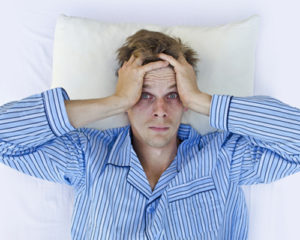Ambien is the brand name for a prescription drug called zolpidem, and it is a central nervous system depressant that is meant to act as a short-term treatment for insomnia and other sleep disorders.
Ambien is part of a class known as “Z-drugs” that have sedative effects similar to benzodiazepines. However, the drugs have a different chemical structure and are supposed to be a safer, less addictive alternative to benzos like Valium or Halcion for those looking for relief from sleep problems.
Ambien is one of the most commonly prescribed non-benzodiazepine sleep aids in the United States, and its perception as a safe drug makes it highly susceptible to misuse and abuse by people assuming that doing so has no negative consequences.
However, it is possible to become chemically dependent and addicted to Ambien. In fact, the reason that it is prescribed strictly for short-term use, typically seven to 10 days, is because of how quickly someone can build up a tolerance to it and become dependent, often in as little as a few weeks.
How Does Ambien Work?
As a Z-drug, Ambien is chemically distinct from benzodiazepines. But because it is a central nervous system depressant, it still works in much the same way, slowing down the activity in the central nervous system, although it creates feelings of calm and sedation specifically to induce sleep, as opposed to the broader anti-anxiety effects of most benzodiazepines.
Ambien does this by altering a brain chemical called gamma-Aminobutyric acid (GABA), which helps regulate feelings of anxiety and excitability by inhibiting the nerve impulses carrying these feelings when it’s time to sleep.
Ambien enters the brain and, mimicking the naturally created GABA, binds with what are known as GABA receptors, specifically targeting the ones directly involved in helping the brain fall asleep. Ambien does this so that it can activate these receptors to produce a huge excess of GABA, overwhelming the nervous system to the point where it is depressed to the point of causing someone to fall asleep.
When abused, Ambien can cause feelings of intoxication and even euphoria, almost like what happens when drinking alcohol.
What Are the Signs of Ambien Addiction?
Being able to identify the signs of abuse and addiction are often more difficult than someone might think, as the behaviors commonly associated with addiction do not appear all at once, and oftentimes a pattern of behavior is only recognizable in hindsight.
This is especially true of Ambien since people are just not as aware of the potential risks involved in misusing and abusing Ambien as not just a prescription medication but also one perceived to be much safer than other prescription sedatives, like benzos or barbiturates.
This perception can make people more likely to misuse Ambien and less likely to recognize that their misuse is escalating to abuse and even addiction until it’s too late. Some noticeable side effects commonly associated with regular Ambien abuse that can act as signs of a growing Ambien addiction include:
- Chronic drowsiness
- Short-term memory problems
- Dizziness
- Nausea and vomiting
- Sleepwalking, sleepdriving
- Difficulty concentrating
- Depression
- Confusion
- Muscle weakness
- Impaired coordination
- Frequent blackouts
As someone reaches full-blown addiction, they will have begun to take Ambien compulsively and be unable to control their usage. Typically, someone addicted to Ambien will also display risky, atypical behavior due to Ambien having become the major motivating force behind nearly all of the decisions. The signs of Ambien addiction, which will become increasingly obvious and serious over time include:
- Using Ambien outside of the prescribed dosage
- Increasing tolerance to Ambien’s effects
- Using Ambien without a prescription
- Experiencing cravings and withdrawal symptoms when not using Ambien
- A noticeable decline in performance at work or school
- Attempting to lie about or hide Ambien use
- Feeling unable to function normally without using Ambien
- Becoming socially isolated and withdrawn
- Experiencing legal or financial issues due to Ambien use
- Being unable to quit using Ambien after multiple attempts
Whether you have been experiencing these symptoms yourself or have observed them in a loved one, it is crucial that you do not wait to seek out the help of a professional addiction treatment center.
What is Involved in Ambien Addiction Treatment?
In the case of addiction treatment in general, starting with medical detoxification is almost always recommended. The goal of detox is to get someone sober and stabilized as well as to treat acute intoxication. This is done by flushing out any trace of drugs and alcohol from someone’s system, along with any potentially associated toxins.
As a Z-drug, the withdrawal symptoms common to Ambien detox are on the milder end of the spectrum and depending on factors like someone’s physical health, and whether or not they were abusing Ambien in conjunction with other addictive substances, they may be able to detox on an outpatient basis.
However, as a depressant, Ambien still has the potential to present withdrawal symptoms that can be dangerous in combination, especially if someone is trying to detox alone, such as insomnia, hallucinations, and suicidal behavior. Because of this, Ambien detox should not be attempted without at least some level of supervision from a medical detox professional.

After someone has finished detox, in order to avoid a very quick relapse, they need to continue their Ambien addiction treatment by working to address the issues at the heart of their addictive behaviors in ongoing care in a recovery program.
Addiction recovery treatment can also be done on either an inpatient and outpatient basis, depending on their specific needs. Someone with a severe addiction who has been abusing multiple substances and has a history of relapse or a co-occurring medical disorder would most likely benefit from living onsite in an inpatient program, where they can fully focus on recovery and have access to 24/7 care.
On the other hand, if someone is in the earlier or milder stages of a substance use disorder and is otherwise in good health and has access to a strong outside network of support, an outpatient program, which allows someone to remain living at home and commute to their treatment sessions, may provide them with sufficient resources needed to make a successful recovery.
Throughout their treatment program, clients will learn to understand addiction and how to manage their own behaviors in a more effective and positive way that will help them maintain lasting sobriety. Some common treatments and therapies that are utilized for this purpose include:
- Individual and group therapy
- Behavioral therapy
- Holistic therapy
- Dual diagnosis treatment
- Medication-assisted treatment
- Motivational interviewing
- EMDR therapy
- 12-step programs
- Relapse prevention planning
How Dangerous is Ambien?
Admittedly, Ambien doesn’t really rank in the same category as illicit drugs or even prescription opioids and benzos. But “not as dangerous” does not mean the same thing as “safe.” Mixing one class of sedative can increase the risk of overdose and over-sedation when taken with other sedatives, including alcohol, benzodiazepines, and barbiturates.
And people using Ambien as directed are likely to experience side effects can be extremely dangerous, depending on the circumstances.
The most common example, to the point where the U.S. Food and Drug Administration (FDA) had to release a cautionary guide, is users not only walking but doing all kinds of things while asleep, with no memory of having done so upon waking, including:
- Cooking and eating food
- Carrying on a seemingly normal conversation
- Having sex
- Leaving the house
- Driving
“While sleep-talking may be harmless enough, the potential dangers of sleep-driving should be apparent. Beyond that, long-term use of Ambien, as well as other Z-drug sleep-aids meant for short-term use have been found to increase someone’s likelihood of dying during the night by 15 percent. ”
Finally, many people who engage in Ambien use do so in conjunction with other depressant drugs to increase the strength of its sedative effects, including benzos, alcohol, and opioids, which can lead to a rapid, possibly fatal overdose, the symptoms of which include:
- Dangerously slow and shallow breathing
- Suddenly passing out
- Intense drowsiness
- Inability to remain conscious
- Coma
- Seizures
Ambien Addiction Statistics
- According to the U.S. Centers for Disease Control and Prevention (CDC), an estimated nine million Americans currently use prescription sleep aids, as reported by CBS News.
- A study conducted by the FDA found that roughly 21 million people in the U.S. have misused or abused Ambien and other similar non-benzo sleep aids at least once.
- According to the 2017 National Survey on Drug Use and Health (NSDUH), about 740 people per day abused Ambien and other prescription sleep aids for the first time.
When compared to drugs like heroin or cocaine, Ambien abuse and addiction may not seem like a big deal. But substance use disorders are never something to be taken lightly, and if you or someone you care about is struggling with an addiction to Ambien, it is important that you take the right steps to treat it before it can escalate or become a gateway substance to something even more dangerous.

